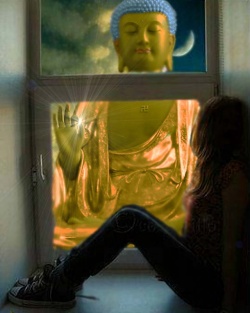Difference between revisions of "Mūlasarvāstivāda Vinaya"
Jump to navigation
Jump to search
| (2 intermediate revisions by the same user not shown) | |||
| Line 1: | Line 1: | ||
{{SanskritTerminology}}[[File:1fgG.JPG|thumb|250px|]] | {{SanskritTerminology}}[[File:1fgG.JPG|thumb|250px|]] | ||
| − | The [[Mūlasarvāstivāda vinaya]] is one of three surviving [[vinaya | + | The [[Mūlasarvāstivāda vinaya]] is one of three surviving [[vinaya lineages]], along with the [[Dharmaguptaka]] and [[Theravāda]]. |
| + | |||
| + | The [[Tibetan Emperor]] [[Ralpacan]] restricted [[Buddhist ordination]] to the [[Mūlasarvāstivādin vinaya]]. | ||
| + | |||
| + | As [[Mongolian Buddhism]] was introduced from [[Tibet]], [[Mongolian ordination]] follows this {{Wiki|rule}} as well. | ||
The [[Mūlasarvāstivāda Vinaya]] is extant in [[Tibetan]] (9th century translation) and {{Wiki|Chinese}} (8th century translation), and to some extent in the original [[Sanskrit]]. | The [[Mūlasarvāstivāda Vinaya]] is extant in [[Tibetan]] (9th century translation) and {{Wiki|Chinese}} (8th century translation), and to some extent in the original [[Sanskrit]]. | ||
{{E}} | {{E}} | ||
[[Category:Mulasarvastivada]] | [[Category:Mulasarvastivada]] | ||
Latest revision as of 03:05, 26 March 2015
The Mūlasarvāstivāda vinaya is one of three surviving vinaya lineages, along with the Dharmaguptaka and Theravāda.
The Tibetan Emperor Ralpacan restricted Buddhist ordination to the Mūlasarvāstivādin vinaya.
As Mongolian Buddhism was introduced from Tibet, Mongolian ordination follows this rule as well.
The Mūlasarvāstivāda Vinaya is extant in Tibetan (9th century translation) and Chinese (8th century translation), and to some extent in the original Sanskrit.
